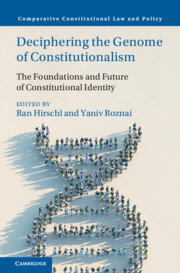Book contents
- Deciphering the Genome of Constitutionalism
- Comparative Constitutional Law and Policy
- Deciphering the Genome of Constitutionalism
- Copyright page
- Contents
- Figures
- Contributors
- Preface
- Acknowledgments
- Introduction
- Part I Foundations, Theory, and Concepts
- Part II Comparative Perspectives
- 8 Confucian Constitutional Identity
- 9 ‘(A-)Religious & Democratic’ Militant Dual Constitutional Identities and the Turn to Illiberalism
- 10 Constitutional Identity in Bangladesh
- 11 Clashing Identities?
- 12 Imposed Revolution?
- 13 India
- Part III American Constitutionalism and Constitutional Identity
- Part IV Emerging Trends
- Index
- References
8 - Confucian Constitutional Identity
from Part II - Comparative Perspectives
Published online by Cambridge University Press: 14 March 2024
- Deciphering the Genome of Constitutionalism
- Comparative Constitutional Law and Policy
- Deciphering the Genome of Constitutionalism
- Copyright page
- Contents
- Figures
- Contributors
- Preface
- Acknowledgments
- Introduction
- Part I Foundations, Theory, and Concepts
- Part II Comparative Perspectives
- 8 Confucian Constitutional Identity
- 9 ‘(A-)Religious & Democratic’ Militant Dual Constitutional Identities and the Turn to Illiberalism
- 10 Constitutional Identity in Bangladesh
- 11 Clashing Identities?
- 12 Imposed Revolution?
- 13 India
- Part III American Constitutionalism and Constitutional Identity
- Part IV Emerging Trends
- Index
- References
Summary
This chapter considers how Confucian values constitute constitutional identity in three Confucian-influenced countries in Asia: China, South Korea, and Singapore. Drawing on Professor Gary Jacobsohn’s framework for the comparative study of constitutional identity, this contribution argues that Confucian commitments are embodied in the formal and/or prescriptive constitutions in the three Asian jurisdictions. The constitutions’ Confucian heritages are continuously dynamic. Disharmony provokes a change in Confucian constitutional identity. The change involves not only judicial but also social and political activities.
- Type
- Chapter
- Information
- Deciphering the Genome of ConstitutionalismThe Foundations and Future of Constitutional Identity, pp. 101 - 112Publisher: Cambridge University PressPrint publication year: 2024

